来云边,邂逅飞鸟与书
2022-03-28林蔚然
林蔚然
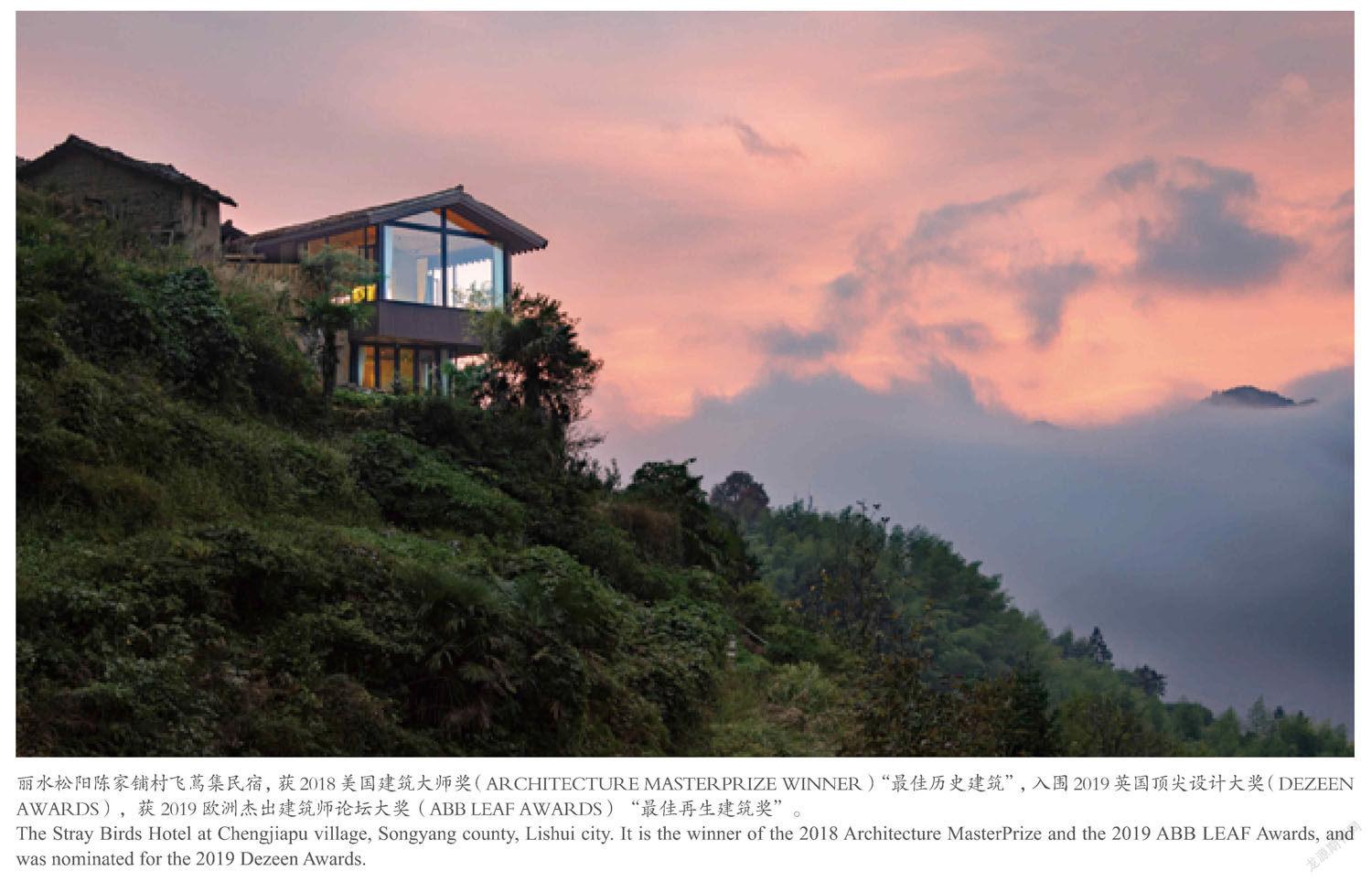
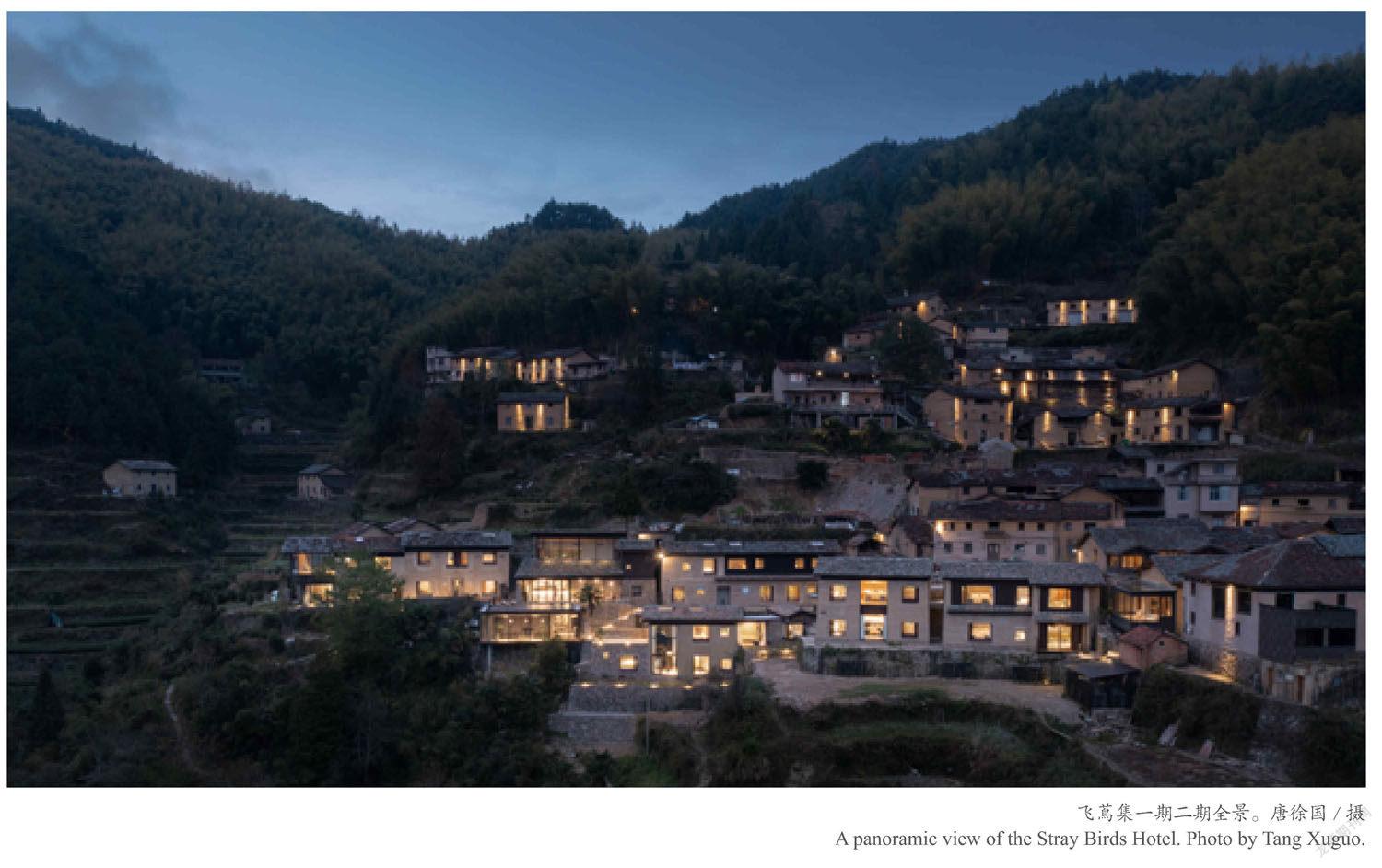
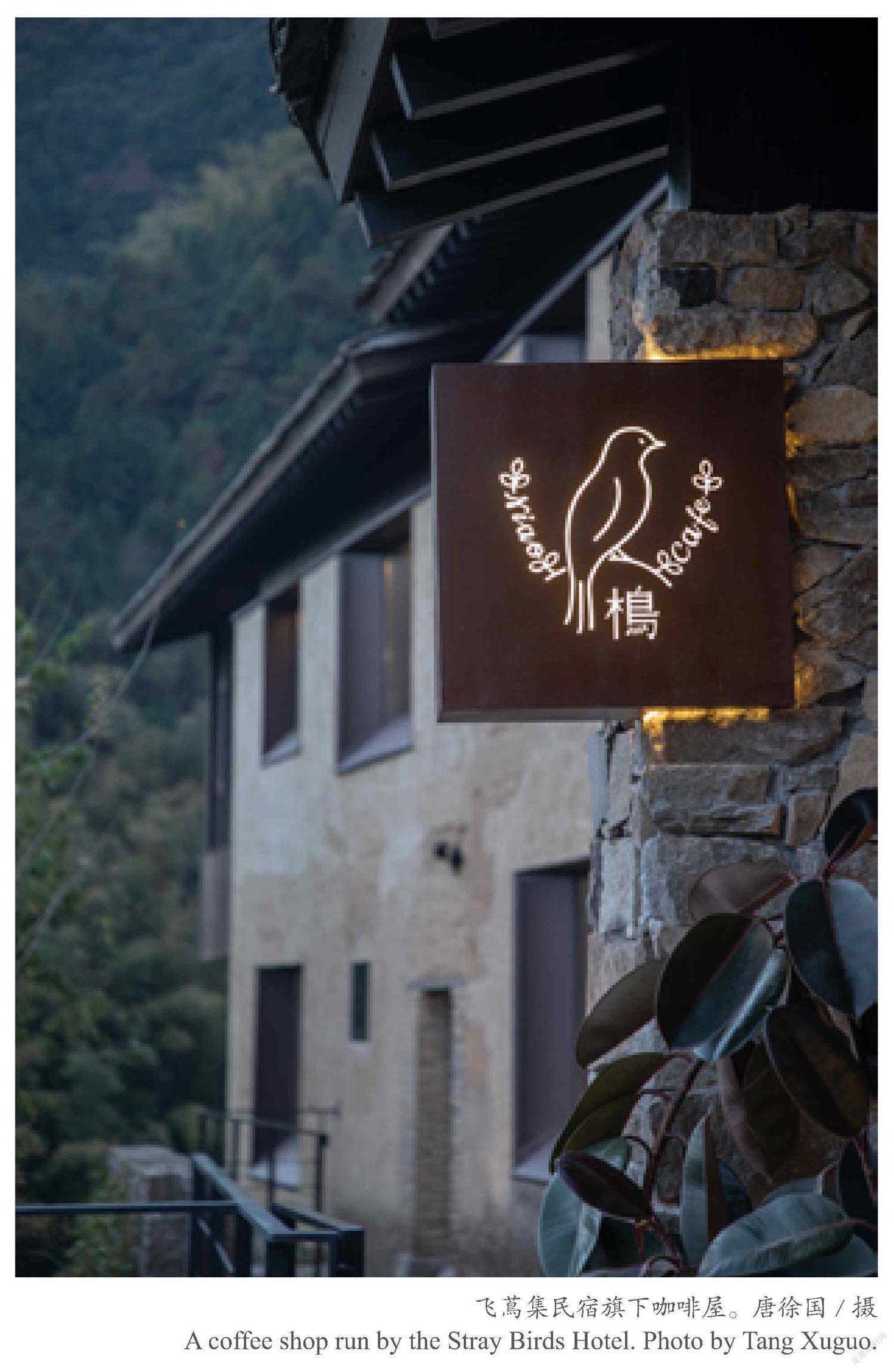
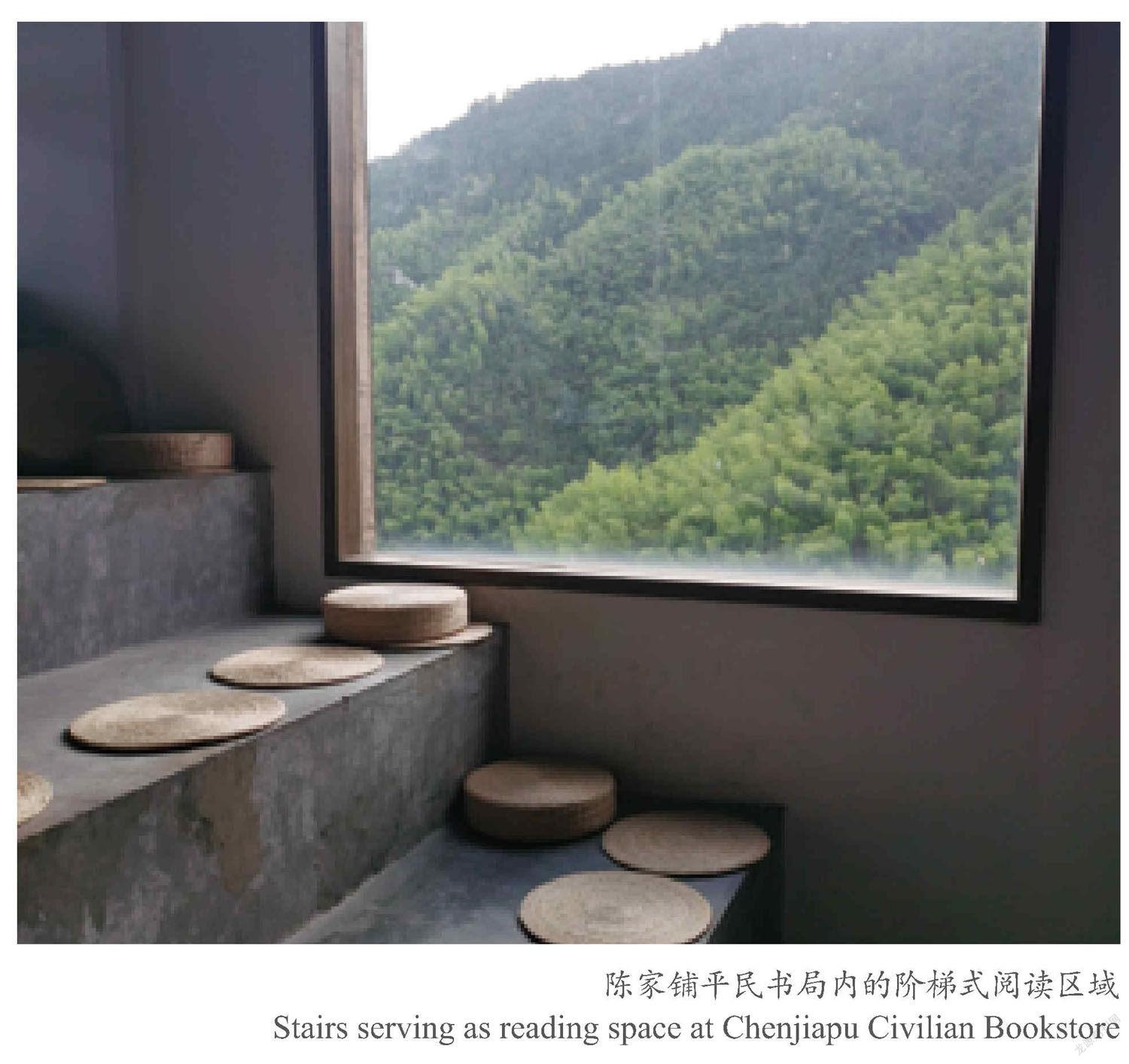
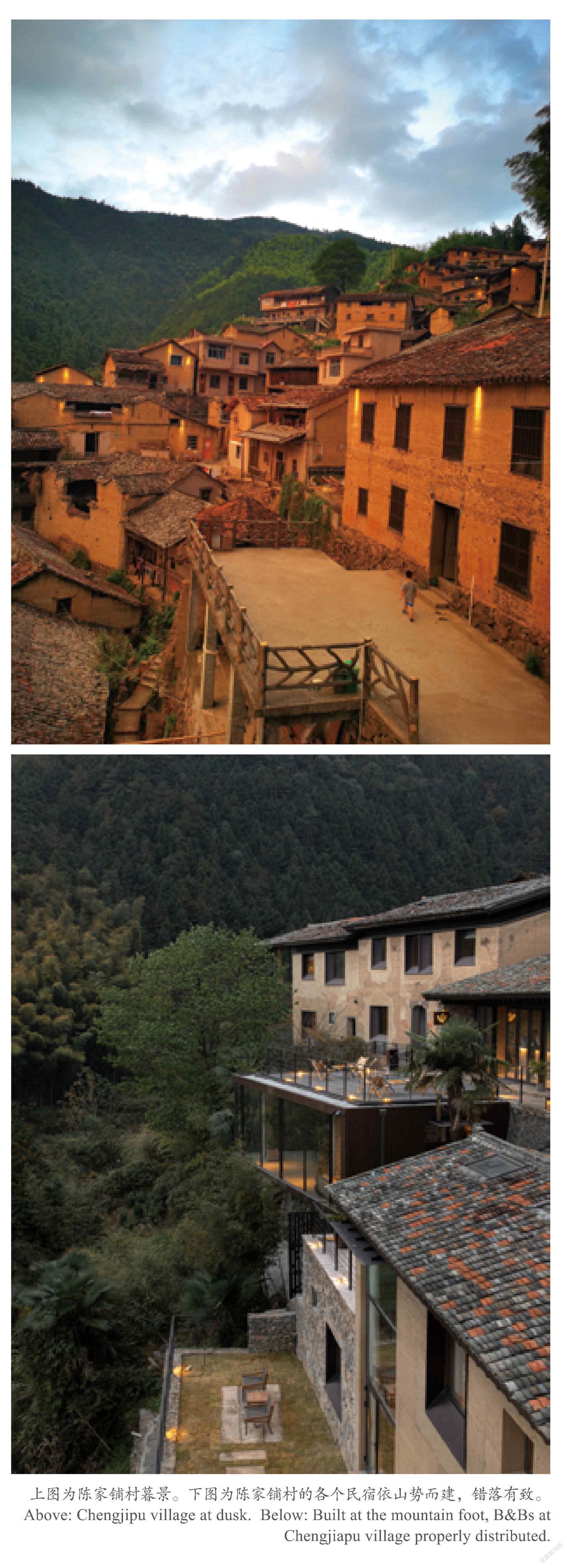
有的时候,身体在各处奔走,而灵魂却停滞不前。经历过白天疲惫不堪的旅程,为何不走慢一点,等一等灵魂?“休息与工作的关系,正如眼睑与眼睛的关系”,找个地方小憩一下吧,在那暮色降临的寂静山林。释放过后,才能继续上路。
云边眠飞鸟
在浙江丽水,有这么一个村落,说是浙江最美古村落也不为过:它就是位于丽水松阳县的陈家铺村,距今有600多年的历史,是崖居式古村落的典型代表之一,有“小布达拉宫”的美称。整个村子背靠平均海拔800多米以上的高山岩石及悬崖,因地势高还面朝峡谷,一年有200多天都笼罩在山云水雾之中。山多地少,北高南低,形成了房屋依山顺势而建的“崖居”奇观:上百幢由泥土、青砖、石头搭起的房屋,从山腰一直延伸到山脚,浑然天成,错落有致,是层次感与艺术感的完美结合。屋顶是新旧迭代的瓦片,泛黄的老石屋夯土墙,老旧木门开开关关扬起的尘埃……时间仿佛在几十年前就不曾流动。
正如每一只飞鸟都能找到属于它的山,每一个故事也都能找到契合它的村子。2018年10月,飞蔦集松阳一期在这里诞生。十二个月,见证了一个从无到有的奇迹。密林之中,悬挑出一座四面通透的玻璃房。内含四间客房,每间都拥有近70平方米的活动空间,温馨舒适,配置齐全。每个房间均不相同,相同的只是追随的处世哲学——人可以坐下的地方,處处有绝佳的风景。
在建筑设计上,保留古村落传统的夯土墙风貌的同时融入现代的元素。墙面材质是毛石夯土里掺杂水泥,既不脱乡野的纯真质朴,又符合现代流行的极简风格。一张卧床直面风景,抬眼就是一座山的睡颜。在这里无需闹钟,自然的闹钟就是云海中传来的一声声鸟啼,是一缕缕曙光从大地反响过去的回声。坐在茶室里,环顾皆是通透的落地窗,囊括了无边的山与云,风与月。在云雾氤氲中浅斟一壶邀青山共饮,见青山多妩媚。人与自然的完美融合,温润舒适的空间,山野的美好恬静,古朴的古村氛围,都让仅有4间客房的飞蔦集常常陷入一房难求的状态。
白天,自有管家拎着食盒送至各个房间。紫薯、米糕、红豆粥……小巧精致的碗碟里盛着品类丰富的早餐,一切都在服务仪式感;夜晚,山野夹缝里的灯火静默地等待着归人,在自然的白噪音覆盖下人声隐约,是老村的呼吸与脉搏。在这里,可以一天什么也不去想,只是坐在茶室里喝茶看书看风景,看着世界从窗边路过,与你像一个过路人似地点头致意。当然,走出门逛逛古村落也是一个不错的选择。只需要走5分钟,就能看到陈家铺村的“悬崖书店”——陈家铺平民书局。
山里读先锋
陈家铺平民书局,是先锋书店的第14家分店。前身是陈家铺村的村文化礼堂,占据了整个陈家铺村的核心位置,与山川大地怡然相望。这栋特别的崖居式夯土建筑本来承担着村子文化中心的功能,因此建筑面积比其他民居更大,空间更开阔,视野也更孤绝。虽然外表看上去和民居相差无几,整体保留了原来复古的木质结构,但加强了其坚固程度,内部也进行了许多现代化设计。书店分为上下两层,入口处是一个宽阔的走廊,一侧是排列整齐的书架,陈列着3万多本书籍,据说这是当年村长的父亲从外面一本一本地背回来的;另一侧则是一个大型的玻璃窗,增加采光的同时也在视觉上拓展了书店的宽度。尽头是一个大型阶梯状的阅读区域,台阶上摆放着藤编坐垫供读者小坐,旁边正对峡谷开了几扇窗。读书的间隙,可以与山林悄然对话,间或掠过一两声鸟啼虫鸣,便是应答。沿着阶梯拾级而上,尽头是一个突出建筑体外的露台,抬头便是近在咫尺的山峦云海,仿佛触手可及。屋顶中央还内嵌一个半透明盒体空间——“冥想室”,高级的几何科幻风,平添一种缥缈的虚无感。里面没有灯,只有从玻璃天窗洒下的柔和自然光线。极致的封闭与开放,在这里形成一种微妙的平衡。
玻璃、阳光板这些现代化透明建筑材料,让路于传统材料作为背景而存在,更凸显出传统古老材料的物质性和手工艺质感。空间顶面排列整齐的原木终止于冥想室的玻璃板,消失的屋顶留下了更多想象空间,柔和而深邃。朴实低调的暗色砖地随处摆放着木制品和藤编,坐在用麻绳吊起的露台上,摊开一本卷了毛边的书,一种怀旧的文化氛围自然而然地产生了。集图书馆、书店、咖啡馆、城乡文化交流中心等多种功能于一身的平民书局,一经建成后迅速在网络上走红。除了“改变了人、自然与建筑之间的关系”之外,还有“先锋书店”这块金字招牌的原因。
很多人对先锋书店的认知,来自南京的先锋书店五台山总店。融合了宗教情结、人文关怀的内部造型被一众文艺青年所推崇,被誉为“南京的文化名片”。从2014年开始,先锋书店就另辟蹊径,尝试将书店融入广大乡村。松阳,就是其中一站。“西归道路塞,南去交流疏。唯此桃花源,四塞无他虞。”这是北宋状元沈晦来到松阳后的诗兴大发。而陈家铺村里的黄墙灰顶鳞次栉比,梯田云水交相辉映,更是与先锋书店的理念一拍即合。这座在松阳深处安了家的书店,接过了为陈家铺村普及文化的重任,并以此为中心向外延伸至周围更久远的老村子,承担起保护传统村落文脉的责任。
蔦与书
主理人蕾拉小姐与飞蔦集的缘分,从一场环游世界的旅行开始。走得越远,就越想归去。当蕾拉小姐来到松阳,她几乎是一瞬间就认定了这里:这是一个能想到家的地方。《说文解字》中注:“蔦,寄生也。”蔦是一种攀缘周围树木的灌木,于是,就有了飞蔦集的灵感。
2017年的秋天,陈家铺村每家每户都在门前晒着番薯干,金黄色的味道浮泛在空气中,像是在等待着什么人的归来。也正是在这个时候,飞蔦集项目正式启动,在这个古老的村庄开始了一段充满温情的故事。
“松阳这个地方,让人迷恋,因为是秘境;让人哭笑不得,也因为是秘境”,蕾拉小姐略带幽默地调侃道。理想是丰满的,但实现起来免不了出现各种各样的问题:首先是前期清理工作,纵横狭小的阡陌以绝对阻拦的姿态挡在大型机器的面前;其次,打地基时因双方习惯不同,导致测量数据有误差,迟迟无法推进施工;再次,乡村的土地之间没有明显界限,租赁一小块土地甚至要找数户人家共同商量。这让蕾拉小姐意识到:历史太久远,有时候也是一块心病。
大型机器进不来怎么办?只好人工清理,也是为了不打扰小村的这份安宁;设计师和负责人无论什么天气都到现场监督施工,实时测量、定点与修改,什么问题都力求当天解决;对于众口难调的情况,负责方只能慢慢“磨”村民和村干部,结局倒也是皆大欢喜;部分林木与建筑设计有冲突,但在负责方的坚持下,还是选择保留这些“原住民”而花费更多时间重新调整布局。这些前清留下来的建筑先一步扎根于此,作为一种逐渐逝去的文化与见证,后来者所能做的应该是保护与尊重,而不是为了一时之利去破坏。
负责改造平民书局的先锋书店招商运营部经理张瑞峰,对此深有感悟。“老建筑有很大文章可做,对其在保护基础上进行改造实践,与文化类尤其是实体书店项目十分契合”,他的介绍透露了平民书局的建筑原则,是在保护陈家铺文化礼堂旧址的基础上再加工。
为游客带来独特消费体验的同时,平民书局也是供村里原住民休憩学习的基础设施。作为一个新型公共空间,民俗文化的藏书主题,结合以地方传统手工艺制品为主的文创,定期举办的文化交流活动、邀请作家驻店创作所形成的场所吸引力,不仅存在于原住民和游客之间,而且在更大维度上构建起城乡沟通的桥梁。一手设计了书局的建筑师张雷希望这座悬崖图书馆能打破许多人对乡村的先入为主的刻板印象,以平民书局为窗口,让人们看到不一样的村庄,不一样的世界。乡村照样可以看书阅读,也可以“文艺”。
“在我的一生里,也有贫乏的和沉默的地域。它们是我忙碌的日子里得到日光与空气的几片空旷之地,”泰戈尔在《飞鸟集》里如是感嘆。奇妙山野或许不像想象中那样贫乏,如这一间山林中的雅舍,如这一方悬崖边的书店,还有很多小众地域,等待着过客的一次邂逅。它们不是批量化的“千村一面”,每一步,都有你不曾见过的好风景。
Mountain Village with Stray Birds and Books
By Lin Weiran
When you are bustling around, sometimes you may feel that you are only moving along with your body, not your soul. Why not slow your pace for your soul to catch up, and take a pause from your busy working life? Go to the woods of serenity, for instance, close your eyes for a short nap there. That way you could have a good release and carry on refreshingly.
In Songyang county of Zhejiang’s Lishui city, there is such a village by the name of Chenjiapu that one may arguably say is the most beautiful in the province. With a history of 600 odd years, it is a classic ancient village celebrated as “the small Potala Palace”. Because the whole village was built along high steeps of over 800 meters high facing the canyon, it is enveloped in humid clouds and fogs most of the year. Its mountainous southward-sloping terrain has contributed to the magnificent residential layout: hundreds of houses made from soil, bricks and rocks range all the way from the hillside to its foot, forming natural layers of artistic perfection.
Just as every bird could find the mountain it belongs to, every story could find the village it fits right in. In October 2018, the Stray Birds Art Hotel was born here, a wondrous B&B project to be created from nothing within a single year. It is a fully transparent glass house, standing hanging in the density of trees. There are four guest rooms, 70 square meters each, cozy and thoughtfully equipped. Differently themed as they are, the four of them are revealing the same philosophy: wherever one could sit down and relax should be somewhere with a view.
In terms of architectural design, the building features traditional rammed earth walls combined with modern elements, rendering a rustic, trendy minimalism style. You could comfortably lie in the window-facing bed in the guest room and admire the mountains. No alarm bell is needed here, for the nature tenderly wakes you up with birdsongs and echoes from the ground. You could sit inside the tea house, surrounded by its French windows and the outside landscape, and slowly sip a pot of tea in the green mountains’ company.
With such unique experiences to offer, this four-room-only B&B is always fully booked. In the daytime, meals are delivered to each room by a butler using a hamper; at night, the glittering lights in the wildness wait silently for the guests to return. You could spend a whole day here in the tea house with nothing on your mind, just drinking tea, reading books and greeting the outer world that is passing by your window. Of course, taking a walk around the ancient village is also advisable. Five minutes, and you will find yourself at a “cliff bookstore”, the Chenjiapu Civilian Bookstore.
Chenjiapu Civilian Bookstore is the 14th branch of the Librairie Avant-Garde, built on the old site of the villagers’ cultural hall. Located at the village center, it embraces an extraordinary view and is larger and wider than ordinary residential dwellings — although they look pretty much the same. But when you step inside, you will find the original wooden structure has been largely preserved and strengthened, and some modernization work has been done to improve the interior design. The two-story bookstore has a wide corridor at its entrance, with orderly bookshelves at one side and a huge glass window at the other. Walking into the back, you will come across large reading spaces — broad staircases to be precise, with some cushions placed atop for readers to rest on and several side windows allowing curious interactions with nature. The staircases lead you to the protruding terrace at the end, where you can look up and almost touch the rolling hills and clouds. What’s more, there is also a fancy, futuristic “meditation room”: no lamps, only a semi-translucent box inserted in the middle of the roof to let in some soft natural light. It seems that here the modern building materials like glass and polycarbonate have stepped back to let their traditional counterparts shine, creating a cultural atmosphere of nostalgia.
Chenjiapu Civilian Bookstore is a versatile tourist attraction, but that alone does not explain its popularity. Many customers are here because of their loyalty to the brand Librairie Avant-Garde whose headquarters are in the city of Nanjing. The Songyang branch is part of its “bookstores going rural” project which was launched in 2014.
The story between Miss Leila and Stray Birds began with her world travel — when it took her to Songyang, she instantly decided to start a B&B here at this home-like place. In the autumn of 2017, the project officially kicked off. “Songyang has this mysterious magic that makes you crazy — in a good way and also in a bad way,” Layla joked.
Tons of problems popped out in her pursuit of creating an ideal guest house: at first there was this cleaning work, which was almost impracticable on the overcomplicated narrow footpaths; then, measurement errors kept occurring in the middle of the foundation laying; last but not least, given that no clear boundaries were there between the rural lands, the construction team had to ask the permission of several households for renting just a tiny piece of land ... To address all the issues, the team invested extra patience, effort and time while making a lot of compromises. Fortunately, it turned out all very well. All parties agreed that the construction work should base on the principle of preservation and respect, not benefit-driven damage.
Zhang Ruifeng, Librairie Avant-Garde’s operation manager in charge of the Chenjiapu Civilian Bookstore project, echoed that opinion. “We could achieve a lot of things with old buildings, such as renovating and creatively transforming the properly preserved ones, and they are a great fit for cultural projects like physical bookstores.” What customers can get from the Chenjiapu Civilian Bookstore is not only special shopping experience but chances to participate in various cultural activities and to interact with writers. According to Zhang Lei the designer, this bookstore is a piece of work set to break the stereotype of rural areas as uncivilized, which could be about literature and art as well.
As Tagore exclaimed in his Stray Birds that “there are tracts in my life that are bare and silent; they are the open spaces where my busy days had their light and air”, the mountainous wilderness has its own charisma, like the Chenjiapu Civilian Bookstore, waiting to be explored.
